Messages from Outside Directors
- A culture of open communication leads to more effective Board of Directors' meetings [Takeshi Ogita]
- The power of diverse talent and the use of IT are the keys to adapting to changes in the environment [Kaori Matsushita]
- Strengthening governance of the nomination and compensation processes to enhance corporate value [Hajime Hayashi]
- A willingness to incorporate diverse opinions leads to further strengthening of governance [Tomoko Nakada]
- Business and financial strategies that flexibly respond to changes in the environment lead to increased corporate value [Kenichi Naito]
A culture of open communication leads to more effective Board of Directors' meetings
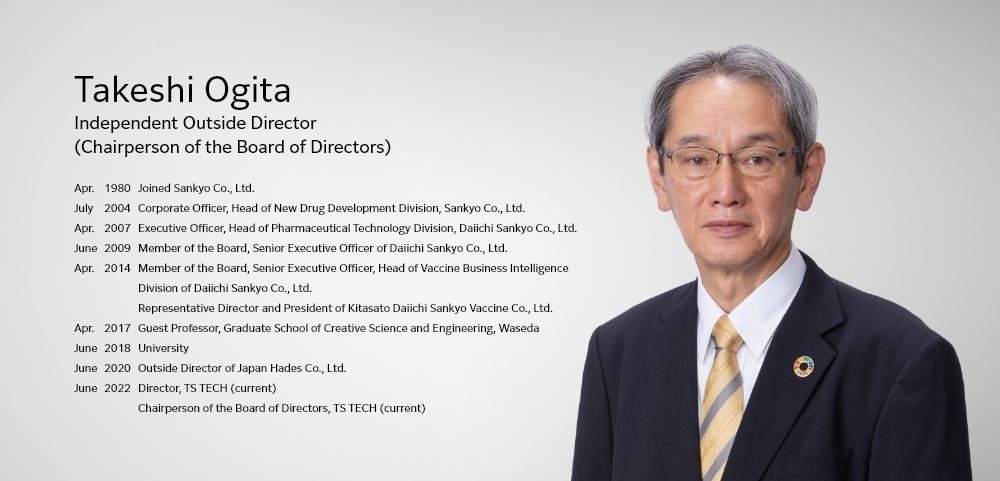
-
In fiscal 2024, the impact of the COVID-19 pandemic on economic activity had largely dissipated, and with it came the return of an environment for communicating without barriers. I feel that this was a year in which I have had many opportunities to feel closer to TS TECH as an outside director, such as through exchanging opinions with other directors and executive officers and by visiting business sites in person.
In recent years, TS TECH’s corporate governance system has been steadily improving. For example, following a resolution at the General Meeting of Shareholders in June 2024, the number of directors was reduced by two to a total of 11, with approximately half of these, or five, being outside directors. In my view, this will further draw clearer lines between the roles of supervision and execution, and I expect that the greater number of outside perspectives will make it possible to make decisions in a more objective and transparent manner.
Let me say that the expectations for outside directors are increasing year by year. At TS TECH, they are making high-level proposals based on their respective areas of expertise, which is contributing to the deepening of discussions at Board of Directors’ meetings. At the same time, discussions regarding the business content require a high level of knowledge and understanding that cannot be supplemented by self-help efforts alone. This has been overcome by having outside directors participate in the Business Strategy Committee from fiscal 2024 and TS TECH has established an environment where a deeper understanding of the company’s situation and challenges can be achieved. At these meetings, the directors in charge and the senior management team engage in enthusiastic discussions on medium- to long-term strategies. It is a valuable opportunity to get a firsthand sense of the company’s vitality and to become well acquainted with the personalities of the individuals involved as well as to consider future talent strategies and succession plans.
Reforms such as the expansion of the number of meetings attended by outside directors are based on the opinions gleaned from the “Evaluation of the Board of Directors’ Effectiveness.” This annual evaluation is of great significance in improving the effectiveness of the Board of Directors. In particular, the candid opinions of outside directors are important, and at TS TECH meetings are convened to exchange opinions with the directors in charge based on the evaluation results. Such discussions can sometimes go on for several hours, and I hope that this will further enhance the “effectiveness” of the effectiveness evaluation.
Recently, the automobile industry has been in media reports due to issues related to quality-related misconduct, which is a very regrettable situation. As a director of a company in the same industry, I am keenly aware of the importance of organizational management and the seriousness of my responsibilities. At TS TECH, the Board of Directors has a long-standing and deep commitment to quality. This issue will not be treated as someone else’s problem. Moving forward, the Board of Directors will continue to closely monitor all matters related to quality issues and safety. To achieve this, I believe it is essential to create a culture that fosters a climate of openness and transparency and one in which even inconvenient truths are escalated without hesitation to senior management.
I have been an outside director of TS TECH for four years, and during that time, the governance system has made major advances. I feel that the organization itself has made great progress in terms of the transparency and persuasiveness of discussions and diversity of human resources, among other aspects, which has definitely boosted its effectiveness. I hope this momentum is sustained, further strengthened, and embedded as part of TS TECH’s corporate culture. I would also like to see it lead to enhanced effectiveness of the Board of Directors, which in turn will lead to further improvements in corporate value.
The power of diverse talent and the use of IT are the keys to adapting to changes in the environment
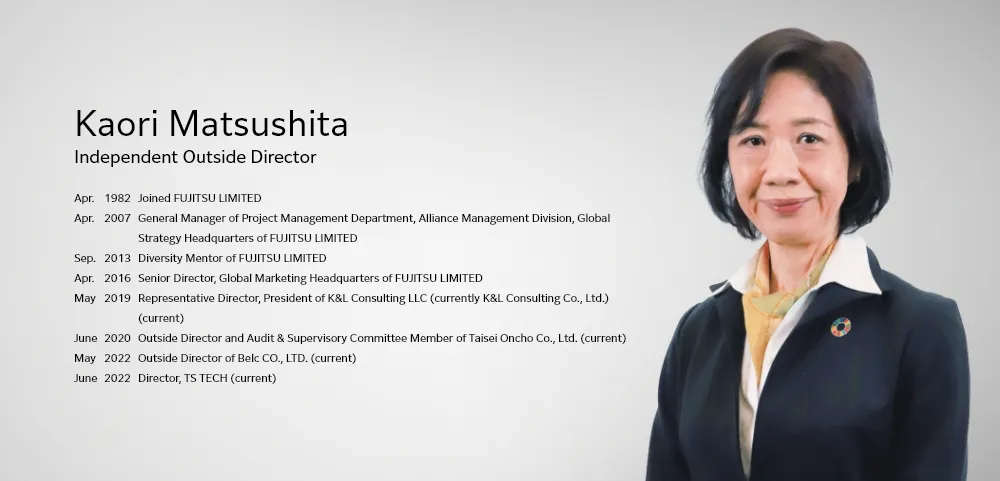
-
The year 2023 was a very challenging one for TS TECH, marked by slumping sales of Japanese-brand automobiles in the Chinese market, soaring energy and raw material prices, and rising labor costs worldwide. The business environment has become even more severe in 2024, and it continues to be a year of challenges for the company’s senior management team.
I recognize that my role is expected to contribute to the evolution of management by leveraging my knowledge of corporate management, global business, talent development, and diversity.
TS TECH’s Board of Directors’ meetings are a forum for open and frank discussions. And in the past, while being conscious of my position as representatives of our shareholders, I as an outside director have actively spoken out based on my own experience and knowledge, and have worked to deepen strategic discussions. For TS TECH to continue to provide new value in a society faced with ever-growing uncertainty and amid a rapidly transforming automotive industry, I will continue to think about the future of TS TECH together with other directors who have different experiences and areas of expertise.
In Japan, there are projections that there will be a shortage of approximately 11 million workers in the labor force by 2040. Against this backdrop, I recognize that securing and developing human resources and working to improve productivity through the use of technology will be the keys to achieving sustainable growth for TS TECH. Based on the results of the annual engagement survey of employees, TS TECH is endeavoring to improve engagement from both Group and department-specific perspectives. I hope that they will continue to generate steady results while repeating a PDCA cycle.
With respect to diversity as well, TS TECH takes a holistic view and is implementing various measures to create an environment where diverse talent can work comfortably and where people with the ability and motivation can demonstrate their abilities. This is essential from the perspective of human capital management and is necessary to achieve the 2030 Vision. However, to achieve the Japanese government’s target of “30% or more female executives by 2030,” I believe it is necessary to further strengthen initiatives focused on women and intend to continue to make proposals at the Board of Directors’ meetings and other meetings.
Furthermore, the Group is also focusing on promoting DX and is proactively deploying IT to improve operations, increase efficiency, and improve productivity based on the concept of using IT to transform work frameworks and work styles. Last year, TS TECH formed a business alliance with KICONIA WORKS, Inc. and has begun considering the use of AI not only in the production domain but also in the management domain. TS TECH is also studying the adoption of rapidly evolving generative AI into its operations as well as establishing internal guidelines. The use of AI is a key point that will contribute greatly to future business innovation and productivity improvements, and I have high expectations for it.
This is my third year as an outside director of TS TECH, and what I have felt from being involved in the management of TS TECH so far is that it has a diligent and straightforward corporate culture. I will actively make proposals with the objective viewpoint of an outside director, so that TS TECH can steadily grow while implementing steady measures to adapt to changes in the world.
Strengthening governance of the nomination and compensation processes to enhance corporate value
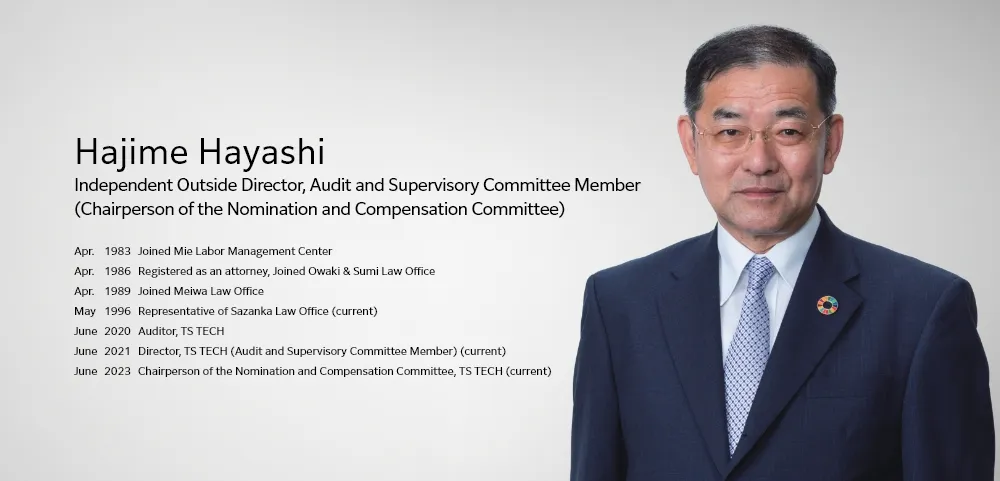
-
I was appointed as the chairperson of the Nomination and Compensation Committee at a Board of Directors’ meeting convened in June 2023 and have worked to strengthen the governance of the nomination and compensation process through the operation of the committee. The committee has been holding discussions on the method of nominating future directors and corporate officers (hereinafter referred to as “officers”), with proposals being made by committee members who are outside directors regarding the qualities required of a president and the method of appointing one. Although we have not yet reached a conclusion as a committee, I believe we have taken a solid step toward formulating TS TECH’s succession plan, which will include the development and selection of the next generation of senior management who will lead the company in the future.
Furthermore, based on inquiries from the Board of Directors, the committee provides recommendations to the Board regarding the appointment and dismissal of officers, as well as officer compensation, and a new representative director was appointed in April 2024. In the process of appointing the candidate, the number of interviews conducted between Audit and Supervisory Committee members and the said representative director increased, compared to previous times.
This fiscal year, we are holding more objective discussions by having the two outside directors who are not Audit and Supervisory Committee members also participate in interviews. Furthermore, the participation of outside directors in the Business Strategy Committee from fiscal 2024 has facilitated the understanding of the skills and personalities of the next generation of officer candidates, including the officers and general manager-level personnel who attend the meetings. Going forward, we will further increase opportunities to interact with internal officers to improve communication, and will also promote deeper discussions on TS TECH’s human resources strategy and succession plans. In concrete terms, we are considering having committee members share information such as interviews with executive officers and training records from the past, to assess the suitability of candidates for the next generation of directors.
Fiscal 2025 is the second year of the 15th Medium-Term Management Plan, and discussions for the 16th Medium-Term Management Plan will begin in earnest around the end of this fiscal year. I intend to contribute to the improvement of corporate value by actively discussing the ideal form of compensation that will further enhance management awareness, such as the composition of executive compensation and the consideration of new KPIs for performance-linked compensation as well as the establishment of new business strategies and performance targets.
Appointment and dismissal of directors
The Executive Committee composed of all representative directors, and directors working in Japan (excluding directors who are Audit and Supervisory Committee members) shall select candidates and then consult the Nomination and Compensation Committee.
Upon consultation, the Nomination and Compensation Committee will hold deliberations that take into account factors such as the selection criteria, the skill matrix, and the diversity of the Board of Directors, and report the results of said deliberations to the Audit and Supervisory Committee and the Board of Directors.
Based on the information contained in the report by the Nomination and Compensation Committee and the opinions of the Audit and Supervisory Committee, the Board of Directors will deliberate and select candidates.
If a director violates a law or regulation or the Articles of Incorporation or in the occurrence of any other event deemed as making it difficult for a director to properly perform his or her duties, the Board of Directors shall, following deliberations by the Nomination and Compensation Committee and the Audit and Supervisory Committee, deliberate on and determine whether to submit a proposal for the dismissal of said director to the General Meeting of Shareholders.
A willingness to incorporate diverse opinions leads to further strengthening of governance
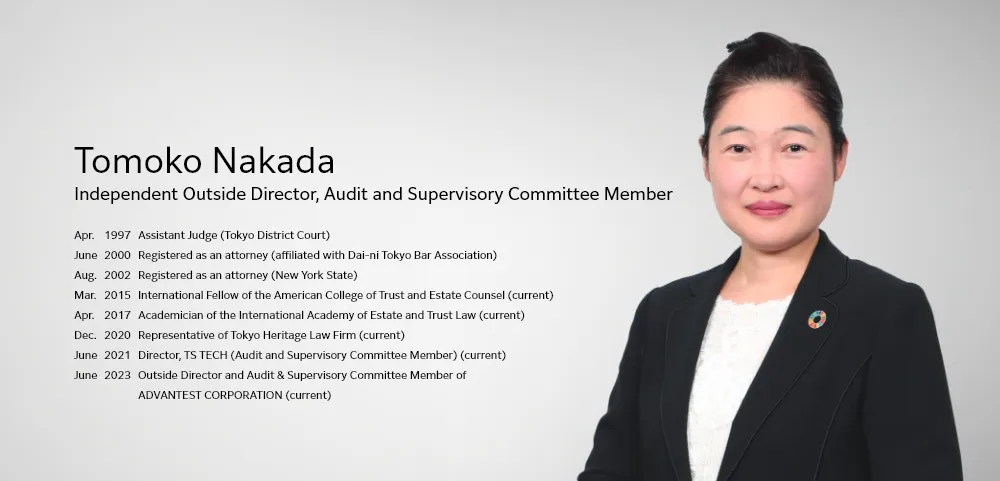
-
TS TECH is actively trying to reflect the opinions of outside directors in management. Fiscal 2024 was a year in which I felt a strong sense of the company’s commitment to this. For example, the opinions of the outside directors were sought first when the Nomination and Compensation Committee discussed the qualities sought for future presidents. After that, meetings among all the outside directors and the directors in charge of business execution were arranged to assess the suitability of the candidates for president and director. Also, in the annual “Evaluation of the Board of Directors’ Effectiveness,” the opinions raised by the outside directors were not set simply aside. Instead, a meeting was held between the representative directors and all of the outside directors, where several hours of discussion took place regarding the opinions and countermeasures. Based on this discussion, specific countermeasures were formulated, and some of these have already been put into practice.
Coupled with the results of governance reforms in recent years, TS TECH has thus firmly established a culture and systems that seek to incorporate diverse opinions from both inside and outside the company. There is a comfortable atmosphere in each committee, and I myself have become more proactive in asking questions and giving my opinions than before. I recall when I made a suggestion from an outsider’s perspective on a matter that had not been considered internally, the president immediately showed understanding by saying “that’s exactly right” and my suggestion was adopted. Conversely, when it was decided that a suggestion I made did not apply to TS TECH, I received heartwarming words from the president after the meeting. In this way, I feel that the company has created an environment where it is easy for outside directors to speak their minds with confidence.
The management structure changed in fiscal 2025, and the atmosphere in the company became even brighter than before. The two representative directors are good partners who can communicate closely with each other, and this has accelerated the decision-making process even further. I also feel that the company has become a more approachable place for employees, for example by creating an atmosphere where it is easy to consult with others. As an outside director who is also an Audit and Supervisory Committee member, I will continue to contribute to the sound governance of TS TECH by closely monitoring the situation within the company so that I can express my opinions to the representative directors without reservation whenever necessary.
Recent governance reforms

Business and financial strategies that flexibly respond to changes in the environment lead to increased corporate value
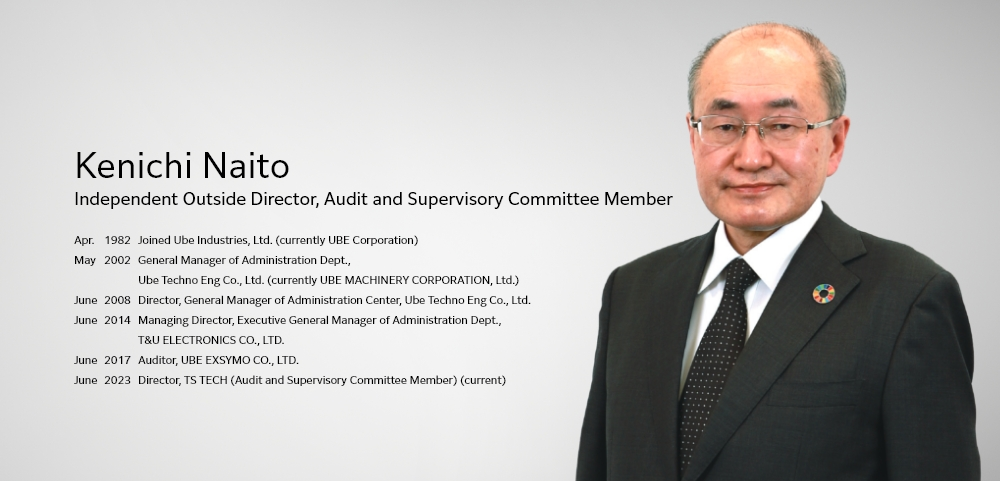
-
After a year of serving as an Audit and Supervisory Committee member of TS TECH, there are two things that have impressed me while deepening my understanding of the company. The first is that the information provided to me is substantial, based on the senior management team’s stance of providing a wide range of information to outside directors. On the company’s internal network, we can check at any time materials and minutes from Executive Committee meetings and Executive General Managers Committee meetings that outside directors do not attend as well as internal audit records from the Corporate Business Audit Department. This framework is exceptionally useful for understanding the company’s activities.
The second is that there is an environment in which outside directors can freely express their opinions and ask questions. For example, the agenda for the Board of Directors’ meeting is explained in advance within the Audit and Supervisory Committee. In addition to being able to ask questions about the agenda, we can also freely express our opinions and ask questions about other matters of concern, and we receive a quick response each time. This helps outside directors to have in-depth discussions in various situations, and I feel that TS TECH’s open corporate culture is beneficial for actively reflecting the viewpoints of outside directors in the company’s management. Fiscal 2025 marks the mid-year point of the 15th Medium-term Management Plan. However, the external environment surrounding the Group, including the overseas automobile market, has changed significantly since the time when this plan was formulated, and it is necessary to advance the business strategy while reviewing the plan as needed.
Under these circumstances, one of the aspects I am monitoring is the progress of the financial strategy. At present, the main focus of TS TECH’s financial strategy is to increase ROE through aggressive investment in growth and strengthening shareholder returns and to further improve PBR. Among these, I believe the company is steadily implementing stable dividend increases and share buybacks to enhance shareholder returns. On the other hand, although the company is continuing to consider highly profitable investment projects, the specific projects that have been realized to date have been relatively small in scale. Investment decisions require an assessment of risk and return, and I expect that making proactive investments that contribute to future business growth, including through M&A, will lead to further improvements in corporate value.
15th Medium-Term Management Plan: Overview of Financial Strategies


